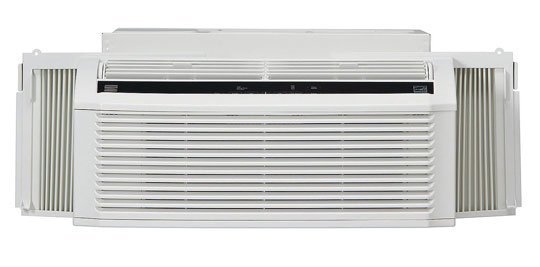Different Types of Air Conditioners, Part I
There are many different kinds of air conditioners, each with their own benefits and drawbacks. In the first part of this three-part blog, we will examine window units and wall units.
Window units are probably the most common type of air conditioners. How do they work, and when should you purchase one? Let’s find out.
How AC Units Work in Brief
An AC unit is composed of several main parts:
- Compressor unit — forces gas refrigerant at high pressure into condenser coils
- Condenser coils — turn gas refrigerant into liquid
- Evaporator unit — creates a cooling chemical reaction when the refrigerant is allowed to evaporate into a gas at a low pressure
- Blower — Forces air over cold elements of evaporator unit, blowing cool air throughout interior of the home
- Filter — keeps particles out of air that the blower is circulating
- Exhaust fan — Removes heat from compressor and condenser generated during their mechanical process to exterior, and also exhausts excess heat and moisture from interior
- The thermostat can be used to automatically shut off or turn on the system when certain temperatures are reached.
For more information on how an air conditioner works, check out our article here. (Please insert hyperlink to article)
Window Units
These are the simplest type of air conditioning unit you can purchase. It is a self-contained unit that integrates all of the above parts into a single unit. Temperature is often controlled in window units by setting the fans speed and a hotter/cooler knob to the desired coolness setting.
The units are “hung” in windows by screwing a plate into the interior side of the window sash, and they are sometimes supported by a bracket structure outside to bear the excess weight. An “accordion” piece of sliding plastic seals out the sides of the window opening not covered up by the unit.
When buying a window unit, keep the following things in mind:
- Wall units come in a large variety of sizes. This means that the amount of air that they can push out can vary greatly. Output power for an air conditioner is measured in a quantity called BTUs, or British Thermal Units. For 100 square feet, you want to have about 5000 BTUs. You want 10,000 BTUs for 500 square feet and upwards of 20,000 BTUs for 1000 square feet or more. If you want more details on what size would be appropriate for your space, contact a professional who will be able to assist you with your sizing questions.
- Wall units are very portable and are a great solution for renters or people who only have a small room to cool. They are not very efficient if you are trying to use them to cool an entire home or apartment. You will often need to have several units to cool a large home. If you are a home owner, you may wish to consider a different type of unit for your cooling needs.
Built-In or Wall Units
A built-in unit is almost identical to a window unit, except it must be installed directly into the building wall with the condenser/compressor side exhausting outside. This setup creates a better seal for the unit, with marginally better air circulation and efficiency.
Due to the better circulation, wall units are much better suited to cooling an entire floor. They typically come with larger BTU options. The increased stability that is afforded to them due to being permanently affixed to a wall allows for larger fans and more complicated controls.
Wall units are marginally more efficient than using several window units. If you are considering cooling an entire multi-level house, you may want to consider one of the many whole home options like a ductless mini-split or central air. More on these types of cooling systems can be found in the second part of this blog.
Whether you are unsure what to get for your home or you are in need of an air conditioning system replacement — or need any service in between — be sure to contact the right expert for you.
Are you in the market for a new heating and air conditioning system? Click here to get free custom quotes from reputable HVAC contractors. You’ll receive upfront pricing without having to invite a contractor to your home or even enter your contact information!
Related articles
Different Types of Air Conditioners, Part II
The Most Efficient HVAC Systems & How They Can Save You Thousands
What Do the Different Energy Ratings for Heating and Cooling Systems Mean?





Comments
Comments are disabled for this post